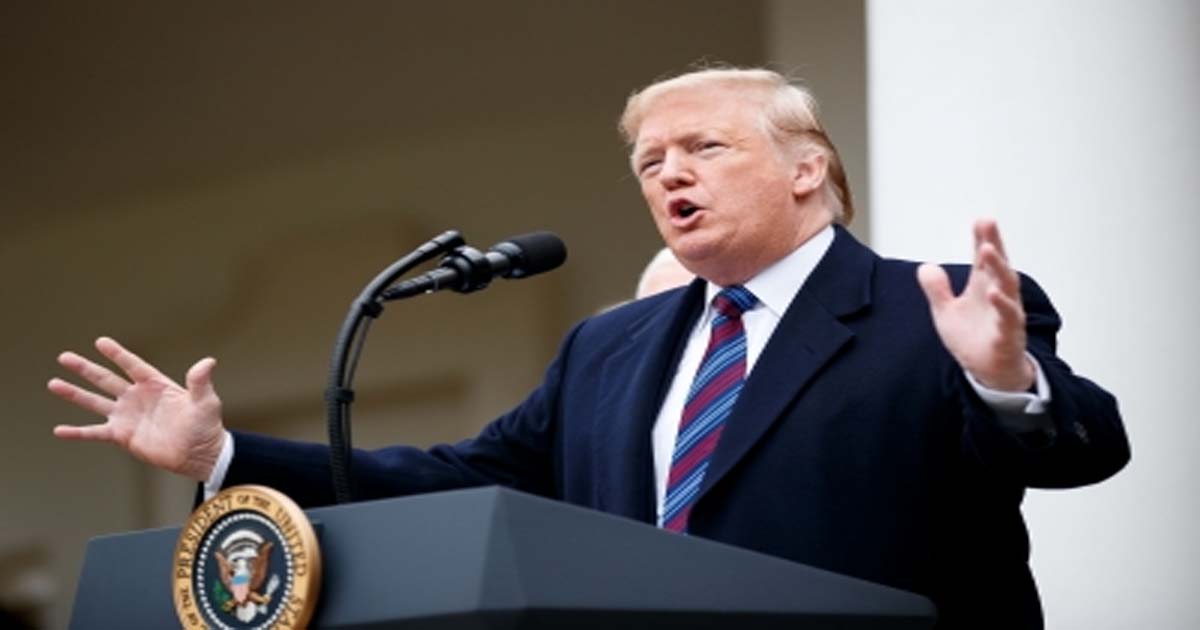Business
12 nations to get US tariff letters on Monday, says Trump

New Delhi/Washington, July 5: US President Donald Trump has signed tariff letters on exports from 12 countries, which are expected to be sent out on July 7 (Monday).
Speaking to the media aboard Air Force One, the US President said the names of the countries which will receive the letters would only be revealed on Monday.
“I signed some letters and they’ll go out on Monday, probably 12. Different amounts of money, different amounts of tariffs,” he told reporters.
“The letters are better. It is much easier to send a letter,” Trump added.
Trump has suggested that the reciprocal tariffs could go even higher, potentially reaching 70 per cent for some countries, and take effect from August 1.
The US President in April unveiled a base tariff of 10 per cent on most goods entering the country, along with higher rates for certain countries, including China. Those elevated tariffs were later suspended till July 9.
Washington has concluded trade agreements with two countries – the United Kingdom and Vietnam.
Meanwhile, India’s high-level official delegation, led by chief negotiator Rajesh Agrawal, has returned from Washington without reaching a final agreement with US officials on the sensitive issue of trade in agricultural and dairy products that the US is pushing for.
However, there is still a glimmer of hope that an interim bilateral trade agreement may be reached at the highest political level in the two countries before the July 9 deadline.
The Indian team was in Washington for negotiations on an interim trade agreement with the US from June 26 – July 2.
According to Commerce Minister Piyush Goyal, India will not hurry into signing a free trade agreement under pressure from any deadline.
Speaking on the sidelines of an event in the national capital, Minister Goyal emphasised that India is ready to make trade deals in the national interest but it “never negotiates trade deals with a deadline”.
The US is seeking broader market access for its agricultural and dairy products, which is a major hurdle, as for India, this is a livelihood issue for the country’s small farmers, and hence, is considered a sensitive area.
While India is looking to secure an exemption from President Trump’s 26 per cent tariffs by concluding an interim deal before July 9, it is also pushing for significant tariff concessions for its labour-intensive exports such as textiles, leather and footwear.
Business
Nifty, Sensex see sharp decline this week amid H-1B, pharma tariff concerns

Mumbai, Sep 27:c
Nifty and Sensex ended with a decline of around 2.50 per cent and 2.54 per cent, respectively, even as IT and pharma sectors came under selling pressure.
Midcap and small-cap indices witnessed even higher selling pressure due to stretched valuations, dipping 4.38 per cent and 4.27 per cent, respectively, for the week.
The IT index came under early pressure amid concerns over rising H-1B visa costs. Shares of Indian pharmaceutical companies fell on Friday after US President Donald Trump announced tariffs of up to 100 per cent on imports of branded and patented pharmaceutical drugs, starting October 1.
The Nifty index erased the gains of the previous two weeks and slipped under its 20-week EMA, tilting the trend weaker in the near term.
The Nifty ended on Friday with losses, tumbling 236.15 points to close at 24,654.70, barely holding above its immediate support zone of 24,500–24,550.
Analysts predicted that sellers will likely continue to control the index unless the index breaches the 24,750–24,850 resistance zone.
Sectoral fundamentals across banking, FMCG, and automobiles remain constructive, supported by domestic policy tailwinds and macroeconomic stability.
However, the sustainability of current market valuations hinges on a visible recovery in corporate earnings and resolution of India-US trade frictions,” they said.
Meanwhile, the rupee continued to weaken, weighed down by ongoing FII outflows and heightened geopolitical risks stemming from US trade actions.
Investor focus will be on upcoming US economic indicators, particularly inflation and employment data. On the domestic front, the RBI’s policy decision and industrial production figures will play a pivotal role in guiding sentiment.
Business
Coal PSUs announce Rs 1.03 lakh as performance linked reward for non-executive workers

New Delhi, Sep 26: Coal public sector undertakings (PSU) announced a performance-linked reward (PLR) of Rs 1,03,000 each for non-executive workers, an official statement said on Friday.
The reward payment will benefit approximately 2.1 lakh non-executive cadre employees of Coal India Ltd and its subsidiaries, along with around 38,000 non-executive workers at Singareni Collieries Company Ltd (SCCL), according to the statement.
The decision has a financial impact of Rs 2,153.82 crore for Coal India Ltd and Rs 380 crore for SCCL.
The government informed that payments will be credited on a pro rata basis based on attendance. PSUs under the Ministry of Coal announced this reward following the sixth meeting of the standardisation committee of the Joint Bipartite Committee for the Coal Industry.
The coal ministry announced that it aims to recognise the contribution and hard work of non-executive workers across all CIL subsidiaries and SCCL and ensure they are fairly rewarded for their efforts.
The payment of PLR provides a timely boost to the workers and their families during the festive season, it added.
The Performance-Linked Reward underlines the commitment of CIL and the Ministry of Coal to worker welfare, motivation, and recognition of contractor contributions.
By providing the PLR, CIL aims to boost productivity, morale, and job satisfaction among non-executive workers, who play a vital role in the company’s mining operations and thus significantly contribute to shaping an Aatmanirbhar Bharat.
The recent GST reforms have eliminated the Rs 400 per tonne compensation cess previously levied on coal, while the GST rate on coal has been raised from 5 per cent to 18 per cent.
The coal ministry had earlier informed that the overall effect of the reforms, despite the increase in GST rates from 5 per cent to 18 per cent, is a lower tax incidence for final consumers, combined with a correction of the inverted duty structure that releases liquidity, eliminates distortions, and prevents large accounting losses for coal producers.
Business
Brent crude steady as India’s Russian oil purchase keeps prices in check: Report

Mumbai, Sep 26: Brent crude prices have remained steady, trading between $67-$69 per barrel, with no fresh global triggers driving volatility, and India’s Russian oil buying has kept the prices in check, a report showed on Friday.
India, among the biggest importers of crude oil, has reiterated that its top priority is ensuring affordable energy for its citizens.
“The country’s imports currently stand at around 1.50 million barrels per day — a level expected to hold steady — with Russian supplies playing a critical role in keeping costs down,” according to the report by Emkay Wealth Management Ltd, the wealth management arm of Emkay Global Financial Services.
The next big move will hinge on how US sanctions and tariff policies unfold in the coming months, the report mentioned.
China, too, is ramping up Russian oil purchases to meet domestic demand.
The report further stated that with both India and China sourcing heavily from Russia, oil prices are expected to remain range-bound, a trend that comes as a relief to importing nations.
Lower energy costs are particularly significant for India, where they help cushion inflation and stabilise the broader economy.
As energy security moves back into the global spotlight, India’s strategy of securing affordable crude supplies underscores the delicate balance between geopolitical shifts and domestic economic priorities, said the report.
Meanwhile, US Energy Secretary Chris Wright has hailed New Delhi as an “awesome ally” and said he is a “huge fan of India,” while calling for deeper energy cooperation between the two countries.
Addressing a press conference in New York this week, Wright praised the country as a “dynamic society” with a “rapidly growing energy demand.”
“A lot of my early time when I arrived in my position was dealing with India, the world’s largest democracy, an awesome ally of the United States, a fast-growing economy, a truly dynamic society that has rapidly growing energy demand because people are increasing their prosperity, their opportunities. I’m a huge fan of India. We love India,” he added.
His statement comes as Commerce and Industry Minister Piyush Goyal also called for expanding India-US energy trade.
-

 Crime3 years ago
Crime3 years agoClass 10 student jumps to death in Jaipur
-

 Maharashtra12 months ago
Maharashtra12 months agoMumbai Local Train Update: Central Railway’s New Timetable Comes Into Effect; Check Full List Of Revised Timings & Stations
-

 Maharashtra12 months ago
Maharashtra12 months agoMumbai To Go Toll-Free Tonight! Maharashtra Govt Announces Complete Toll Waiver For Light Motor Vehicles At All 5 Entry Points Of City
-

 Maharashtra1 year ago
Maharashtra1 year agoFalse photo of Imtiaz Jaleel’s rally, exposing the fooling conspiracy
-

 National News12 months ago
National News12 months agoMinistry of Railways rolls out Special Drive 4.0 with focus on digitisation, cleanliness, inclusiveness and grievance redressal
-

 Maharashtra11 months ago
Maharashtra11 months agoMaharashtra Elections 2024: Mumbai Metro & BEST Services Extended Till Midnight On Voting Day
-

 National News1 year ago
National News1 year agoJ&K: 4 Jawans Killed, 28 Injured After Bus Carrying BSF Personnel For Poll Duty Falls Into Gorge In Budgam; Terrifying Visuals Surface
-

 Crime12 months ago
Crime12 months agoBaba Siddique Murder: Mumbai Police Unable To Get Lawrence Bishnoi Custody Due To Home Ministry Order, Says Report












